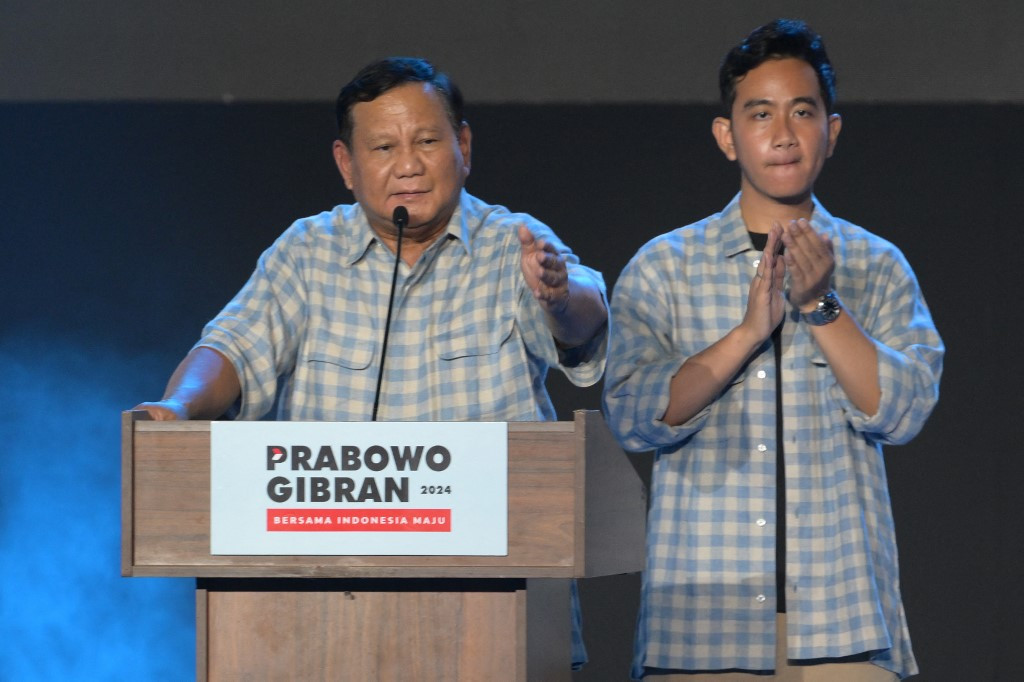Popular Reads
Top Results
Can't find what you're looking for?
View all search resultsPopular Reads
Top Results
Can't find what you're looking for?
View all search resultsAnd now, back to business!
With all the uncertainty that comes with a regime change, Indonesia's business world has breathed a collective sigh of relief at the highly likely possibility of closing the chapter on the presidential election in just one round.
Change text size
Gift Premium Articles
to Anyone
 Presidential candidate Prabowo Subianto (left) addresses his supporters alongside running mate Gibran Rakabuming Raka during the pair’s victory rally in Jakarta on Feb. 14. Quick count results from pollsters after voting in the 2024 simultaneous presidential and legislative elections closed on Wednesday had Prabowo-Gibran at an insurmountable lead of nearly 60 percent. (AFP/Bay Ismoyo)
Presidential candidate Prabowo Subianto (left) addresses his supporters alongside running mate Gibran Rakabuming Raka during the pair’s victory rally in Jakarta on Feb. 14. Quick count results from pollsters after voting in the 2024 simultaneous presidential and legislative elections closed on Wednesday had Prabowo-Gibran at an insurmountable lead of nearly 60 percent. (AFP/Bay Ismoyo)

The surprisingly vast lead Prabowo Subianto and Gibran Rakabuming Raka have taken in Wednesday’s election, as shown by pollsters’ quick count projections, has been welcomed by the business community, mostly because we can all get back to work now.
While representatives from domestic and foreign associations queried by The Jakarta Post refrained from making political assessments, they expressed relief at the possibility of avoiding a runoff in June.
Quick counts are conducted by independent pollsters and do not reflect official results, due to be announced next month, so the campaigns of Anies Baswedan and Ganjar Pranowo have not conceded defeat.
Be that as it may, the picture that is emerging is clearer than anything surveys had suggested, and the expectation of a single-round election is reassuring for investors: They want to get on with business and not worry about who will be in charge of the country come October.
They may also be looking forward to Indonesian society returning to more fruitful public discourse about improving laws and regulations to support business activities and economic development, especially after election debates that revolved around politics too much and too little around policies.
The fact that the election proceeded without serious disruption – or worse, riots – across the archipelago will be particularly reassuring for foreign investors, given that Indonesia is still a young democracy.

Much has been said and written over the past months about President Joko “Jokowi” Widodo’s influence on the election. These include criticisms leveled at the incumbent for distributing social assistance during the campaign period and for showing tacit support for the Prabowo-Gibran ticket, as many believed that a head of state ought to maintain neutrality in an election to choose their successor.
But any semblance of impartiality went out the window when Prabowo picked Jokowi’s eldest son as his running mate following the Constitutional Court’s controversial ruling that added an exception to the age of candidacy.
A bitter aftertaste will also linger from the rift between Jokowi and the Indonesian Democratic Party of Struggle (PDI-P), the party that helped bring him to power.
These developments are now firmly in the past, however, and many businesspeople will be grateful to have at least one uncertainty behind them. Looking back on the election, they might conclude that it wasn’t pretty, but at least it’s over and done with.
That seemed to be the mood of the stock market when trading resumed on Thursday after the election day holiday: The Indonesia Stock Exchange (IDX) Composite gained 1.3 percent, outperforming other Asian markets.
That also suggests investors are happy with the quick counts pointing to a single-round victory for Defense Minister Prabowo and Jokowi’s eldest son Gibran, who campaigned on a platform of continuity and hence, predictability rather than change.
Given that the Jokowi administration has received praise from many sides for its macroeconomic and fiscal policies, continuing them is deemed good for business, even if some of Prabowo’s campaign promises raised concerns about budget and funding.
Prabowo’s team even signaled that it would be comfortable with a significantly higher debt-to-GDP ratio to support economic activity and his free school lunch program. Government bondholders will likely seek some reassurance that the future administration will not depart from the path of budgetary prudence, even if it does increase public spending.
Moreover, the quick count results suggest that key projects of the Jokowi administration, from the new capital city to the downstream mineral industry and electric vehicle factories, will continue.
The election had been viewed as a potential risk for long-term megaprojects, since convincing investors that government commitments would be maintained across a regime change is a key challenge in a democracy.
The prospect of closing the election chapter soon means we can all get back to business, finally.









